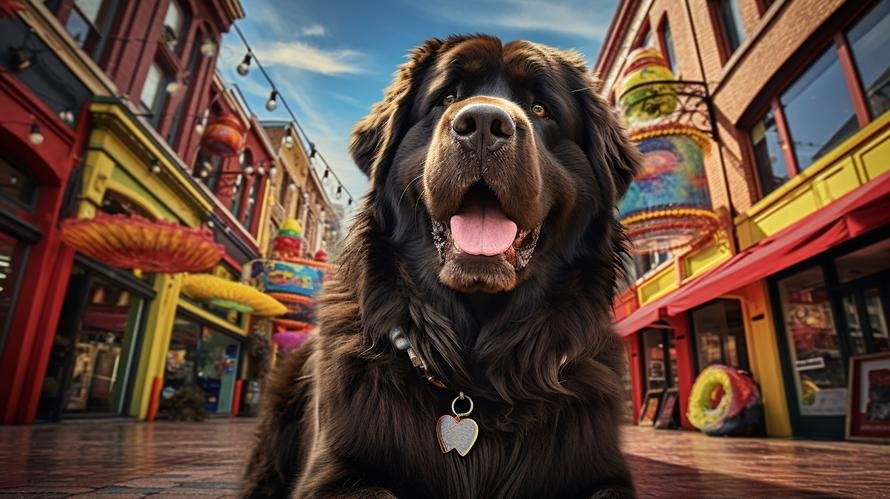You may not know it, but Newfoundland dogs, also known as “Newfies,” are actually canine royalty. Why, you ask? Well, other than their majestic, bear-like appearance, these dogs are known for their remarkable swimming ability. They also have a rich history as working dogs, hauling fishnets, carrying loads, and even rescuing drowning people! These gentle giants are a breed like no other.
Now, with such extraordinary traits, an intriguing question naturally arises: does a Newfoundland dog need special dog food?
Wonder no more! We’re embarking on an enlightening journey to answer that very question. Fetch your reading glasses, comfort your Newfie on your lap (If you can still see the screen over its hulking mass, that is!), and let’s set sail.
First, let’s delve into the enchanted roots of these brave and brawny dogs. Native to—no surprises here—the Newfoundland and Labrador province of Canada, the Newfoundland dog is a splendid mix of hardy breeds, including the Great Pyrenees and possibly the Tibetan Mastiff. This sturdy lineage has granted the Newfoundland dog an impressive stature and a heart of gold.
Newfoundland dogs are gigantic, even among large breeds. Males can weigh anywhere between 130-150 pounds, while females tip the scales at 100-120 pounds. Their dietary needs are a direct result of their size, lifestyle, and specific health tendencies.
Any dog food you choose for your Newfie should be formulated to cater to large breeds. Large breed dog foods contain essential nutrients in balanced amounts considering their size and other unique physiological demands. They also ensure that the food supports your Newfie’s bone and joint health, which is vital given their size.
However, not all large breed dog food will do. Newfoundland dogs have a slower metabolism compared to other breeds. This means they burn calories less quickly, making them at high risk for obesity. The dog food you choose should be low-glycemic to make sure your Newfie doesn’t pack on extra pounds.
Obesity-related diseases, such as diabetes, arthritis, heart disease, and even cancer, are common among Newfoundland dogs if their diet and weight aren’t carefully managed. Therefore, a calorie-conscious, nutrition-focused diet is almost non-negotiable when it comes to feeding your Newfie.
Moreover, some Newfoundland dogs have a predisposition towards dilated cardiomyopathy (an enlarged heart condition) and cystinuria, a kidney condition. If your Newfie has these concerns, their diet will again play a crucial role. Special dog foods with certain restrictions prevent these conditions from worsening and can improve the quality of your pet’s life.
A diet rich in Omega-3 fatty acids is also critical for a Newfoundland dog. These dogs have a luscious double coat that insulates them in freezing conditions and keeps them buoyant in the water. Omega-3 fatty acids will keep their dense coats shiny and healthy.
The consumption of ample protein is another requirement to consider for a Newfoundland dog’s diet. High-quality sources of protein assist in the maintenance and repair of their massive muscles. Look for dog food that relies on whole meats or meat meals as the primary protein source.
It’s also essential to ensure that your Newfoundland receives necessary nutrients, minerals, vitamins, and antioxidants for overall good health.
In a nutshell, Newfoundland dogs do need special food, considering their enormous size, slower metabolism, and susceptibility toward specific health issues. However, this doesn’t mean you need to search for ‘Newfoundland Dog-Specific Food.’ Rather, your focus should be on high-quality, large-breed dog food that offers balanced nutrition, bolsters bone and joint health, supports a healthy coat, and is targeted towards weight management. Tailoring the diet according to your pet’s particular health concerns is also vital.
Remember, every dog is unique. What works great for one Newfie might not work for another. It’s always wise to consult a trusted veterinarian to tailor your pet’s diet meticulously. Don’t be surprised when fruits, vegetables, and plenty of freshwater are recommended too. Just like us humans, a varied diet can be key to good health.
Feeding your Newfoundland dog isn’t just about filling a bowl; it’s an act of love. You’re helping this fluffy royal member maintain their healthy weight, look their best, and have the strength and energy to fill their day with endless tail wagging. Every meal is an opportunity to show how much you care—why not make it the best it can be?
To sum it all up, venturing into the Newfoundland dog’s world teaches us that although these gloriously large canines may not need a breed-specific food, careful thought is required. Their diet must be high-quality and designed for large breeds with their specific health leanings in mind.
In the end, you’ll find that keeping a bounce in those hefty bodies and a shine in those baby-like eyes is worth every bite. Happy feeding!



